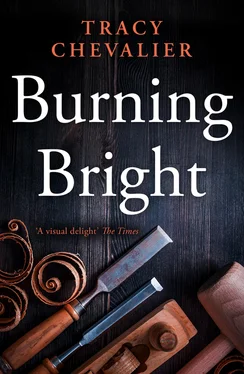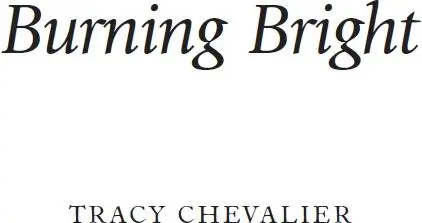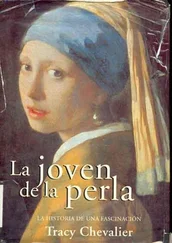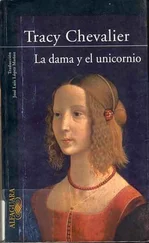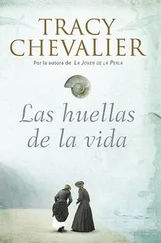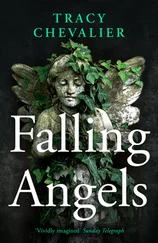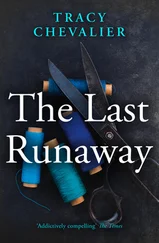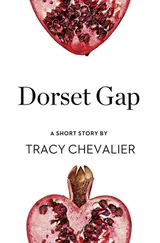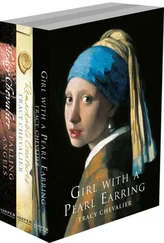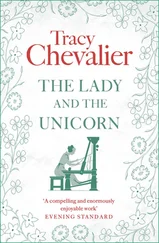
The Borough Press
An imprint of HarperCollins Publishers Ltd
1 London Bridge Street
London SE1 9GF
www.harpercollins.co.uk
First published in Great Britain by HarperCollins Publishers 2007
Copyright © Tracy Chevalier 2007
Chapter head motifs © Neil Gower
Cover design by Holly Macdonald © HarperCollins Publishers Ltd 2019
Cover image © Shutterstock.com
Tracy Chevalier asserts the moral right to be identified as the author of this work.
A catalogue copy of this book is available from the British Library.
This novel is entirely a work of fiction. The names, characters and incidents portrayed in it are the work of the author’s imagination. Any resemblance to actual persons, living or dead, events or localities is entirely coincidental.
All rights reserved under International and Pan-American Copyright Conventions. By payment of the required fees, you have been granted the non-exclusive, non-transferable right to access and read the text of this e-book on screen. No part of this text may be reproduced, transmitted, down-loaded, decompiled, reverse engineered, or stored in or introduced into any information storage and retrieval system, in any form or by any means, whether electronic or mechanical, now known or hereinafter invented, without the express written permission of HarperCollins.
Source ISBN: 9780007178360
Ebook Edition © 2014 ISBN: 9780007324323
Version: 2019-06-07
For my parents
Table of Contents
Cover
Title Page
Copyright
Dedication
Part I: March 1792
Chapter One
Chapter Two
Chapter Three
Chapter Four
Chapter Five
Chapter Six
Chapter Seven
Part II: April 1792
Chapter One
Chapter Two
Chapter Three
Chapter Four
Chapter Five
Part III: May 1792
Chapter One
Chapter Two
Chapter Three
Chapter Four
Chapter Five
Chapter Six
Part IV: June 1792
Chapter One
Chapter Two
Chapter Three
Chapter Four
Chapter Five
Chapter Six
Chapter Seven
Part V: September 1792
Chapter One
Chapter Two
Chapter Three
Chapter Four
Chapter Five
Chapter Six
Chapter Seven
Part VI: October 1792
Chapter One
Chapter Two
Chapter Three
Chapter Four
Chapter Five
Chapter Six
Chapter Seven
Chapter Eight
Chapter Nine
Part VII: December 1792
Chapter One
Chapter Two
Chapter Three
Chapter Four
Chapter Five
Chapter Six
Chapter Seven
Chapter Eight
Part VIII: July 1793
Chapter One
Chapter Two
Chapter Three
Chapter Four
Chapter Five
Chapter Six
Chapter Seven
Chapter Eight
Chapter Nine
Chapter Ten
Chapter Eleven
Acknowledgements
About the Author
By Tracy Chevalier
About the Publisher
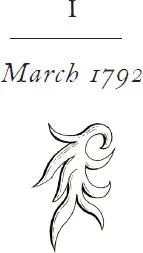
There was something humiliating about waiting in a cart on a busy London street with all your possessions stacked around you, on show to the curious public. Jem Kellaway sat by a tower of Windsor chairs his father had made for the family years ago, and watched aghast as passers-by openly inspected the cart’s contents. He was not used to seeing so many strangers at once – the appearance of one in their Dorsetshire village would be an event discussed for days after – and to being so exposed to their attention and scrutiny. He hunkered back among the family belongings, trying to make himself less conspicuous. A wiry boy with a narrow face, deep-set blue eyes and sandy fair hair that curled below his ears, Jem was not one to draw attention to himself, and people peered more often at his family’s belongings than at him. A couple even stopped and handled items as if they were at a barrow squeezing pears to see which was ripest – the woman fingering the hem of a nightdress that poked out of a split bag, the man picking up one of Thomas Kellaway’s saws and testing its teeth for sharpness. Even when Jem shouted ‘Hey!’, he took his time setting it down again.
Apart from the chairs, much of the cart was filled with the tools of Jem’s father’s trade: wooden hoops used to bend wood for the arms and backs of the Windsor chairs he specialised in, a dismantled lathe for turning chair legs, and a selection of saws, axes, chisels and augers. Indeed, Thomas Kellaway’s tools took up so much room that the Kellaways had had to take turns walking alongside the cart for the week it took to get from Piddletrenthide to London.
The cart they had travelled in, driven by Mr Smart, a local Piddle Valley man with an unexpected sense of adventure, was halted in front of Astley’s Amphitheatre. Thomas Kellaway had had only a vague notion of where to find Philip Astley, and no idea of how big London really was, thinking he could stand in the middle of it and see the amphitheatre where Astley’s circus performed, the way he might back in Dorchester. Luckily for them, Astley’s Circus was well known in London, and they were quickly directed to the large building at the end of Westminster Bridge, with its round, peaked wooden roof and front entrance adorned with four columns. An enormous, white flag flying from the top of the roof read ASTLEY’S in red on one side and AMPHITHEATRE in black on the other.
Ignoring the curious people on the street as best he could, Jem fixed his eyes instead on the nearby river, which Mr Smart had decided to wander along, ‘to see a bit o’ London,’ and on Westminster Bridge, which arched over the water and pitched into the distant mass of square towers and spires of Westminster Abbey. None of the rivers Jem knew in Dorset – the Frome the size of a country lane, the Piddle a mere rivulet he could easily jump across – bore any resemblance to the Thames, a broad channel of rocking, choppy green-brown water pulled back and forth by the distant tide of the sea. Both river and bridge were clogged with traffic – boats on the Thames, carriages, carts and pedestrians on the bridge. Jem had never seen so many people at once, even on market day in Dorchester, and was so distracted by the sight of so much movement that he could take in little detail.
Though tempted to get down from the cart and join Mr Smart at the water’s edge, he didn’t dare leave Maisie and his mother. Maisie Kellaway was gazing about in bewilderment and flapping a handkerchief at her face. ‘Lord, it’s hot for March,’ she said. ‘It weren’t this hot back home, were it, Jem?’
‘It’ll be cooler tomorrow,’ Jem promised. Although Maisie was two years older than he, it often seemed to Jem that she was his younger sister, needing protection from the unpredictability of the world – though there was little of that in the Piddle Valley. His job would be harder here.
Anne Kellaway was watching the river as Jem had, her eyes fixed on a boy pulling hard on the oars of a rowboat. A dog sat opposite him, panting in the heat; he was the boy’s only cargo. Jem knew what his mother was thinking of as she followed the boy’s progress: his brother Tommy, who had loved dogs and always had at least one from the village following him about.
Читать дальше
